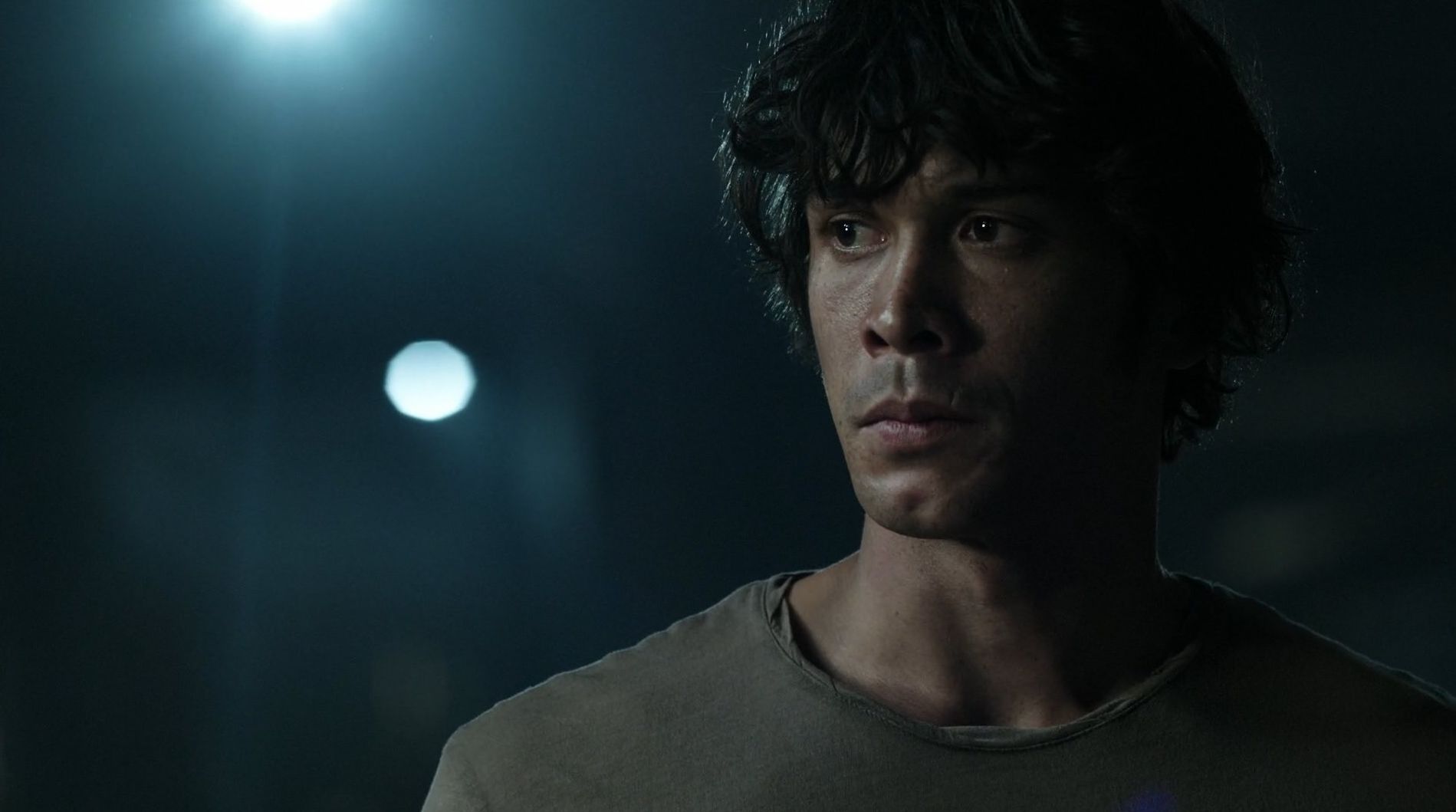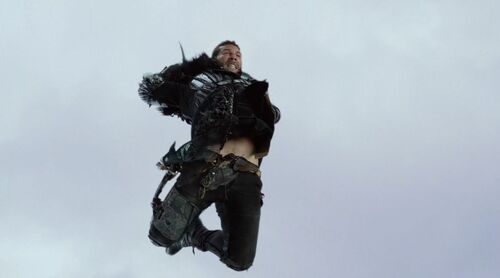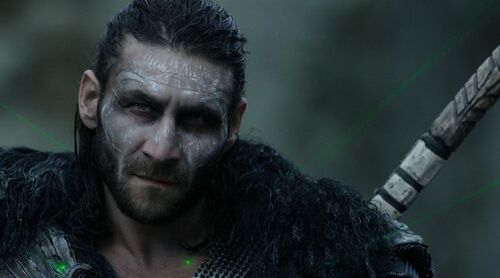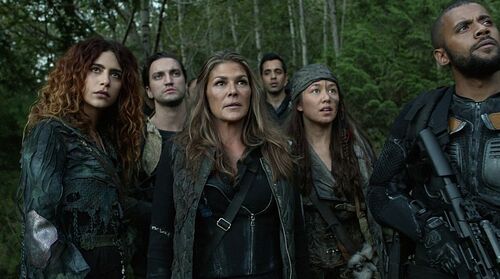
The 100 S3E4: "Watch the Thrones" Review
 Watch the Thrones is a frustrating episode in which one character’s entire arc is sacrificed for the sake of plot expediency. There’s a cool fight, though.
Watch the Thrones is a frustrating episode in which one character’s entire arc is sacrificed for the sake of plot expediency. There’s a cool fight, though.
This is a long review. Because of events in this episode, I felt it necessary to do a lengthy breakdown of Bellamy. The actions he takes will have ramifications throughout this season, and it's necessary to lay out why I think they are out of character and jarring to the narrative. There is a review summary at the end.
A LITTLE STORY
One January evening last year, I booted up Netflix to find a new show to watch. Netflix recommended The 100, a show I’d never even heard about. I started the first episode and didn't stop watching for three days until I caught up to Spacewalker, an incredible episode of television by any standard.
The 100 blew me out of the water. It was gritty, scrappy, and authentic. The writers’ love for the characters showed through each thoughtful bit of development, as well as the careful plotting to make sure the audience understood their choices. Why did Clarke, Bellamy, Lincoln, Finn, Kane, Anya, Tsing, Cage, or Dante do what they did? For love. For their people. Out of their own carefully articulated strengths and resonant, relatable weaknesses.
I understood every character, even if I hated them. And you know what? I never fully hated them, because I understood them. In a show that burns through plot at the pace The 100 does that’s quite a feat of storytelling. To be sure, there were missteps—Finn’s storyline in season 2 being the most prominent, but also the lack of clarity surrounding Lexa’s betrayal at Mount Weather—but on a whole, the show succeeded.
So I find myself at a crossroads with this episode, Watch the Thrones, because somehow this season the pacing, plotting, and characterization of the entire show shifted from fast to runaway train. I know that some reviewers and fellow fans are pointing to one storyline—Bellamy and Pike—but I find the problem is actually systemic.
Simply put, the show is moving way too fast, and in doing so, undercutting just about every characters’ previous development (or forgetting those characters for episodes at a time). Also in the service of breakneck pace, it is using weak plot devices (like fridging or the secrets/lack of communication trope, which I’ll talk about later) that it has eschewed in the past.
What seemed to be a minor hiccup in episode two (would Bellamy really not check that cave for Clarke’s captor before attempting her rescue?) has burgeoned into a potentially catastrophic weakness for the season.
THE GOOD
Before I dole out the criticisms, I want to praise what the show is doing well. The 100 has always had excellent action sequences, and this season leveled up. Several levels, even. The stunt choreography is incredible. Lexa and Roan’s fight scene was choreographed, acted, and shot to perfection. Lexa throwing the spear to kill Queen Nia, the woman who had Lexa’s lover Costia killed, was a satisfying moment of both revenge and political smarts. Roan, whether he likes it or not, is now somewhat beholden to Lexa.
This episode also did away with what I call “soap-opera framing” that it had going on last episode, especially within one-on-one conversations. Moving the camera back to include scenery or the other participant in a conversation adds necessary context to heavily weighted interactions.
Devon Bostick and Christopher Larkin gave amazing performances as Jasper and Monty tried to sort out their grief, anger, and blame. Going back to the dropship made my heart ache. I hope this is a turning point for Jasper, because he can’t linger much longer being so broken in such a brutal world. I also hope it’s a wake-up call for Monty, too, that he needs to take care of himself. Monty shoulders many people’s burdens—Bellamy, Jasper, his mom—and it might be time for him to choose his own path.
Roan, though technically a guest star, has been a pillar of this season. While Lexa may have made him Ice Nation King, I don’t for one second think that tensions between the Ice Nation and the Coalition are over. Zach McGowan’s caustic and clever portrayal has added a presence to the show that I didn’t even know I needed. Never leave, Roan. Never leave.
plot, character, and storytelling
One of the first rules that writers learn is that characters drive the plot. The plot is merely a service to the greater story. If done well, characterization and plotting should be seamless. Even in fast-paced narratives like The 100, the viewer should be given the context to understand why characters are making the decisions they are making. It’s increasingly important to The 100 that the audience understands the emotional and psychological toll the last six months has taken on the characters.
That has not happened.
The breakneck pacing of this season has undercut two seasons of steady character development. This is the most obvious in the storylines involving Clarke and Bellamy. First, let’s talk about Clarke, because at the moment it has the least ramifications for the future story.
Clarke has always been a woman full of initiative. She doesn’t always make the right choice, but she tries. She’s scrappy (that Anya fight, anyone?), intelligent, stubborn, manipulative, and caring. A complex female character if there ever was one. I don’t always agree with what she does, but I know why she does it.
That’s why it’s disappointing to see Clarke swing between being feral and passive this season, and then ultimately sidelined in her own story. It's true that she is recovering from an immense amount of trauma. That’s briefly, and most effectively, addressed with Niylah in episode one. Once she was caught by Roan and brought to Lexa (and subsequently spit in Lexa’s face), I hoped Clarke would start to recover her agency. And what better place to get back to manipulative-Clarke than Polis with all of that political intrigue?
So far that hasn’t happened, except for the rash and poorly-thought-out attempt on poisoning the Ice Queen. What even was that? How did she expect to get away with it? And if not for Lexa killing Nia later in the episode, Clarke just put her people in a ridiculously precarious position. It’s this frustrating lack of details in a recklessly paced plot that makes me, frankly, want to scream. Clarke has made bad decisions before, but she’s never been outright careless.
If this is the show’s way of showing me a compromised Clarke, then they need to address that’s what they’re doing. Clarke goes from spitting in Lexa's face and trying to kill her, to hatching plans to assassinate Lexa’s enemies and having lover-like conversations after combat. It's enough to give you whiplash, while also undermining what the story is trying to accomplish—which is also, unfortunately, unclear at the moment.
The other issue with Clarke’s storyline is her ascendancy to power. She abdicated her position within the Sky People when she left after Mount Weather. She shunned power and responsibility to go heal, or to escape, whatever it was she hasn’t articulated yet. To have her thrust into an ambassadorship for a people she hasn’t interacted with in three months stretches belief. Sure, Clarke wants to protect them. But does she know what’s going on in Arkadia?
No, she doesn’t, as highlighted by the arrival of Pike.
we need to talk about bellamy blake
I’ve never written a review where I wanted to add more qualifiers to my criticism. So here they are:
Michael Beach, who plays Pike, is a wonderful actor. Pike’s pain, determination, and charisma are fully integrated into his character. He’s charming with an edge hardened by the burden of seeing most of his people die.
Bob Morley, likewise, is brilliant. His very being conveys Bellamy’s anger, guilt, and self-loathing. The sorrow of failure permeates his posture. Guilt, fear, and rage radiate from his eyes. Even the inflections he uses in Bellamy’s voice add layers of nuance to each line. It’s incredible and thoughtful work on Morley’s part.
There is an incredible richness to the storyline of a young man, broken by recent loss but also by a crushing life, having to choose between two powerful father figures (Kane being the other) who are, in their own way, right. Watching Bellamy navigate that situation is a story worthy of several episodes, at least.
Alas, we have one episode, and it’s not even the focus of that episode. So, about 15 minutes are allotted to kneecap two seasons worth of Bellamy's development.
First, let’s sketch out Bellamy’s arc since season one. In the beginning of season one, Bellamy shot Chancellor Jaha as a part of a broader coup attempt. He did it so he could be on the dropship with Octavia, his beloved sister that he had spent 16 years hiding from the Ark authorities. On the ground, his first move was to set up an anarchist camp (”whatever the hell we want!”). There is no doubt that he was angry, disaffected, and as episode 1.6 “His Sister’s Keeper” shows us, full of self-loathing and brokenness.
After the debacle of almost-hanging Murphy, Bellamy begins to hand over leadership to Clarke. They jointly lead the camp for the rest of the season. His anger is channeled into keeping the delinquents alive. Emotionally and psychologically, he begins to wrestle with the implications not only of shooting Jaha, but of inadvertently causing the death of 320 Arkers when he stole a communication radio out of Raven’s pod. “I’m a monster,” he says to Clarke, tears sliding down his face. It’s a breakthrough moment, and the story follows up on it. Bellamy’s anger fuels both his determination to protect not only Octavia, but all the delinquents. He begins to self-sacrifice to save those he cares about and puts himself on the front-lines for their defense.
In season two, Bellamy tries to bring Finn back from the edge, to save Finn from making the same mistakes he did. “There are some lines you can’t uncross,” he says, pleading with Finn to not torture a Grounder that they caught for information on Clarke’s whereabouts (episode 2.3 "Reapercussions").
Further in season two, Bellamy’s tactical skills, as well as protective care and concern, are shown as he navigates Mount Weather as an inside man. He keeps the imprisoned delinquents as safe as he can while delivering crucial information to Clarke on the outside. In the finale, when the awful choice must be made to irradiate Mount Weather, therefore killing everyone inside, he pulls the lever with Clarke to help shoulder that burden.
That’s not to say Bellamy’s perfect. He is not. He can, he has, and he will make mistakes. It’s even believable that he would choose Pike's side, if the story had the proper time to develop. But that’s not what the story showed us.
Instead, when we first see Bellamy, he’s adjusting well to life after the Mountain. He’s a guard, a trainer, and goes on scouting missions with his friends. He has a girlfriend who he likes. His desperation to find Clarke in 3.2 is the only indication that all is not well.
Therefore, I do not, for one moment, believe that Bellamy Blake sides with Pike to massacre a peacekeeping force. I do not believe that Bellamy Blake makes that decision over a couple of shots at a bar. I do not believe that Bellamy Blake, older brother to his beloved sister Octavia, who is practically a Grounder herself, decides that all Grounders are evil and need to die. That he gives up three months of mentor-ship with Kane to follow someone who hasn't lived and shared the last crucial, devastating six months with him. Without even a conversation about it, no less.
I do not believe that Bellamy Blake, anarchist and rebel, becomes in the course of one evening a blind follower to a man staging both a coup and a massacre.
This is especially frustrating because this development hangs on two very weak plot devices. Number one, the fridging of his girlfriend Gina (which I talked about here) and two, an unbelievable lack of communication between characters.
Conveniently, there is no one in camp to bring Bellamy back from the edge. Monty is out with Jasper. Raven is MIA for the episode, not even appearing at the memorial to Gina, her friend. Kane only offers a weak, “Don’t do this,” as Bellamy turns in his guard jacket. Clarke is, of course, in Polis playing cheerleader to Lexa. Bellamy and Octavia don’t share a scene, even though their support of each other was demonstrated last week. Finally, there is no conversation with Lincoln, a person he trusts enough to induct into the guard.
Lincoln is one of the most troubling aspects of the episode, especially in relation to Bellamy’s decision to join Pike. In the beginning of Watch the Thrones, the Arkers have a memorial for those who died at the Mountain. The memorial turns into a near-riot when scouts return with news of Indra’s army camping out in the forest. A rock is thrown at Lincoln by Pike’s stooge, Gilmer. Bellamy defends Lincoln. That night, a few hours after the memorial, he stands opposite of Lincoln and Octavia demanding they step aside so Pike & Co. can exit the gates.
And let’s not forget that when Abby and Kane bring the guard to arrest them, Bellamy begins chanting, “Pike! Pike! Pike!” It was one of the most jarring, out-of-character moments I’ve ever watched.
in sum
Watch the Thrones, and season three so far, is an unfortunate case of a runaway plot undercutting every other aspect of the story. Clarke and Bellamy are not acting like themselves. Crucial information and context has been left out (Why was Roan banished? Why is Clarke suddenly okay saving Lexa’s life all the time?). Because of the pace, some storylines and characters are being left behind, and the themes of the season haven’t been well established.
There are twelve more episodes to go, and I am interested to see how the writers choose to weave all of these storylines together. Hopefully, they will open up space in the narrative to allow these fascinating stories the time they need to properly develop.


